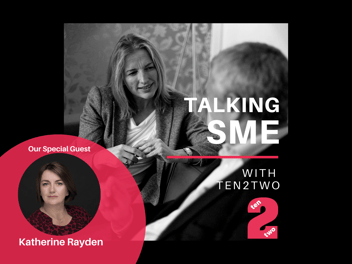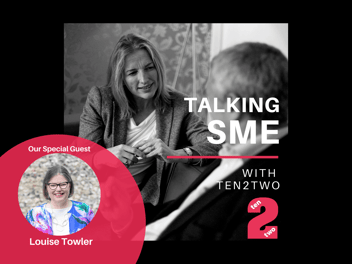Talking SME Podcast: Leading like Gareth Southgate
Our latest guest on Ten2Two’s Talking SME podcast is Adrian Malpass, Executive Coach, Mentor and Board Advisor. In this episode we discuss the leadership qualities he saw Gareth Southgate display during the Euros, how leading like Gareth Southgate can help SME business leaders and how business owners can best utilise their skill sets.
A bit about Adrian
Adrian is a renowned award-winning executive coach, mentor and board adviser. Focusing on leadership, strategy and managing growth for businesses of all sizes. He is also Curator of GlosBiz®, Gloucestershire’s largest business network.
Adrian is a fully qualified, national award-winning Executive Coach, trained mentor and project manager. As well as a Licensed Emotional Intelligence Consultant developing emotionally intelligent leaders and teams.
With over 34 years’ of experience Adrian is a proven business transformation specialist, with extensive experience and success in working in the SME professional services sectors, as well as some of the UK’s major PLCs. He specialises in improving profitable performance through enhanced leadership and business management. Identifying and delivering strategic and sustainable growth. Working alongside boards, individual Directors, senior managers and business owners. Usually in coaching, mentoring, project or consultancy formats at a strategic level. He has worked successfully with over 350 businesses to date, including in non-executive director roles.
Click here to find out how Ten2Two can help your business survive and thrive.
‘Leading like Gareth Southgate’ is just one in our series of podcasts where we talk about a wide range of topics. We talk with business experts, and also offer broad insights to help SMEs become more successful.
Transcript
Tracey Adams (00:00):
Hello, and welcome to talking SME our quickfire chat with business leaders. I’m Tracey Adams, and today I’m delighted to be talking to Adrian Malpass about leading like Gareth Southgate. Adrian is a highly experienced executive coach, mentor and business advisor. And if you’re based in or around Gloucestershire, you may also know Adrian as the founder of Glos Biz Gloucestershire’s largest business network. Welcome Adrian.
Adrian Malpass (00:24):
Good Afternoon. How are you?
Tracey Adams (00:24):
I’m alright thank you, Adrian. I’ve been scouring, everything you’ve been doing over the past few years and I came across a blog. A blog you wrote a few months ago about Gareth Southgate’s leadership style, and you compared it to the business community.
Adrian Malpass (00:46):
I mean, it would have to be about his leadership style because I don’t know anything about football.
Tracey Adams (00:52):
Well, it’s interesting. You do seem to have a certain amount of admiration for him despite not being a football supporter. So that’s good.
Adrian Malpass (01:03):
I mean, this goes back to, there was a football tournament back in the summer.
Tracey Adams (01:09):
Yeah there was some big tournament.
Adrian Malpass (01:11):
I mean the England football team were everywhere. They were obviously doing quite well. So whether I liked it or not, getting a sort of a view of how he was doing as a leader, was really quite interesting for me. Cause I mean, I didn’t gain any knowledge about the football, but, every time he was up in front of the media, he just did so well. And he was so clear about what his role was and where the boundaries of his role were. So, he was very keen to take responsibility. For example, he obviously made very clear decisions and he communicated them really well. And also he was very good at, making sure that the actions required to deliver those decisions were clearly understood by people, and that’s so important. You think of any good leader and you will know a good leader.
Adrian Malpass (02:14):
I know plenty of good leaders, they do have those characteristics, the responsibility, the decision-making, the actions that they allocate to people are very, very clear and very appropriate, but they also have, this thing where they’re able to trust the key members of their team. And they have confidence that those people are going to deliver the decisions and the actions required. That’s actually quite a rare thing, there’s not a lot of people that put all those things together, whether it’s in a sporting context or a business context, even a family context, dare I say even a political context, but we won’t go down that road.
Adrian Malpass (03:03):
Being a leader is fundamentally about being human. The bits I saw about Gareth Southgate, he stuck his hands up from time to time and said, got it wrong. That’s a really important part of growing as a leader. Is that just remember you’re human, you’re not going to get it right all the time. Anyone that says they’re going to get it right. Aren’t going to get it right. But also when you get it wrong, stick your hand up, take responsibility, work out a way of correcting it, but also let your team know that actually, yeah, I messed up, I got it wrong, but I’m going to sort it out.
Tracey Adams (03:51):
So Adrian, you work with leaders, you help leaders. So how does a business owner or manager, more like a business owner if we’re looking at an SME type context. They get to a point and they must realise they need help from you, for example. So when do they get that help? How do they go about it? What sort of journeys do you see?
Adrian Malpass (04:16):
Okay, so going back to basics most people. So this is in owner managed businesses. So when somebody starts a business, they generally do it for two basic reasons. Either they’ve got a good idea or they’re really good at something. They don’t start a business because they’re good at running a business. So as the business grows, which is a sign that their business idea or their particular skillset is a good thing. The business gets to a point where they have to employ more people and the business keeps growing and growing and growing. And that’s a sign that there is demand out there for that particular idea or service or product.
Adrian Malpass (05:08):
However, there is this psychology and it’s particular to this country that if you started the business, you should be running it. Wrong. If you started the business, going back to the two basic reasons why you started the business, because you’ve got a good idea or because you’re good at something that is what you should be sticking to.
Adrian Malpass (05:34):
If you are a really good designer or a solicitor or recruitment agent, or, you’re a good chef and you’ve come up with some wonderful food products to sell. The best thing you can do is carry on doing that and leave the running of the business to somebody that really knows what they’re doing.
If you stick to what you do best, the company will make more money, be far more successful and develop a much stronger and more respected reputation because you will still be the driving force behind it. Managing a business is a particular skill set. And a lot of people would say, oh yeah well, I can learn how to do that. Yes you can. But all the time you’re learning that it’s going to take you a lot longer to get it right, when you could be spending that time doing the things that generate profit for the business.
Adrian Malpass (06:39):
I would say, by the time business owners or people at board level call me in, probably 95% of them, it’s gone beyond the point where they should have called me in three, six months or a year earlier. Simply because they took the view, I can do this. Now that is never an attitude I would try and dilute. This I can attitude is really, really important in business. However, the ability to take that step back and recognise where you need to apply that, is really important.
So if you’re a really good financial advisor, for example, the best thing you can do is do the financial advising. If your business is so successful, that there are 15 financial advisors within your team, then you can do the regulatory bit by all means, because you will understand that, but actually managing the organisation is something you really shouldn’t be spending your time doing because you can be doing wonderful things for your clients.
Tracey Adams (08:00):
Have you found Adrian, that when you’ve tried to address situations where it may have gone a bit too far and you’re trying to get them to understand. To move into the area where they’re most suited and comfortable. How does that go down?
Adrian Malpass (08:23):
Well, good question. Thanks for that. A lot of it has to do with the, person or the individual or the team of directors that I’m working with. Some people will stick their hands up the first time I meet them and say, I’m getting this wrong. Yeah. I’m not doing as well as I could be doing and it’s taking me away from doing what I love or what I’m really good at, et cetera, et cetera. They’re the easy ones. Probably a quarter of the ones I deal with are the ones that have got very firmly, heels dug in. No, no, I’m quite capable of doing this. They will keep that view of, I can run this business. I can run this business. Right up to the point when they realise they can’t. But by then potentially quite a lot of damage has been done.
Adrian Malpass (09:32):
Now, I’m not saying that damage can’t be undone, but it takes a lot more work to resolve those issues before you can move on than if they just said, actually, do you know what I’m spending all this time trying to run the business. And that’s all I’m doing. Just having that little bit of realisation. I wonder if there’s someone out there that can help me, someone that can help me for a couple of hours a week or couple of hours a fortnight or half a day, a month or a day a week, whatever it is. But, just find someone that can help and quite often picking up the phone to somebody you know in the business world, perhaps, who’s knowledgeable about who is out there and just talk to them about it, because a problem shared is a problem halved.
Adrian Malpass (10:30):
So they say, and keeping it to yourself is not a good thing to do. And that applies to so many parts of life. Doesn’t it? But so many business leaders or business owners will try and keep it to themselves and just try and keep sort of bashing their head against the proverbial brick wall. That what they find is by the time they throw their hands up and say, right, I need help. We’ve got to undo quite a few things, or just go right back through the system and make sure that things are done right.
Tracey Adams (11:08):
What we’re talking about, as you’d said, it’s particularly relevant to owner managed businesses, isn’t it? Because it’s been your baby, your idea, you’ve grown with it, you know what’s going on. You do know what’s going on. You’ve got to a point, you care for it.
Adrian Malpass (11:25):
Oh, exactly. There’s this emotional connection to it, it’s my baby. Therefore I should be looking after it. Yeah. But if you put that into a human context, babies grow up into children and then they go to school. So all of a sudden you’re handing your kids over to the school for 6, 7, 8 hours a day. Yeah. So if you can do that with kids, perhaps you should do it with your business. It’s a similar analogy. It’s not exclusive to owner managed businesses. I go into larger, more established businesses that have well established boards of directors and similar problems. Quite a lot of business directors would actually be better off doing something else within the business. They’d actually be able to drive the business success much better if they weren’t having to take on the responsibilities of director level stuff.
Adrian Malpass (12:35):
And again, people become directors, and they think alright, knees under the boardroom table. Which is great because they recognise the responsibility that comes with it. But equally the reason they were identified as a potential director is because they have a certain skill set or set of experiences or abilities, they could well be better off managing the factory or, delivering products or services to make them much more profitable. I’m not saying that the drive for profit is the only thing within business because you want to make sure, the people you employ are happy in their jobs and they actually want to come to work for example. So, it’s a complex thing, but just because you’ve got the director badge doesn’t mean to say in every case that you should have.
Tracey Adams (13:43):
No. Absolutely. Obviously, most of the audience we talk to from Ten2Two’s point of view, are SMEs. And if you had one or two nuggets that you would just try to get people to focus on, because we were saying before, when we were discussing this, this is a huge topic, leadership. We could absolutely talk about so many different facets for hours and hours. So if you just wanted to say to these SME owners, what would be your top two pieces of advice?
Adrian Malpass (14:22):
Without doubt, the simplest one is be human. You’re not going to get it right all the time. You are going to get it wrong. The chances are you’re going to get it right at least 51% of the time. Let’s hope. But just be human, whether it’s good or bad, let the people around you see that you’re not a robot. And there will be times when you’re close tears and there will be times when you want to bounce around the office, like you’ve had too much sugar. But let your team see that, let them see that you’re a human being.
By doing that they will be much more inclined to help you out where they can. And they’ll also be much more inclined to come to you when they’ve got their own concerns, which in turn strengthens the team. So that would be my first one, be human. The second one would probably be, don’t be afraid to ask for help.
Tracey Adams (15:34):
You could apply that to anything couldn’t you.
Adrian Malpass (15:37):
Well, if in doubt, ask. At the beginning of lockdown, here we are towards the end of 2021. Get that right. Back at the beginning of the pandemic in March, 2020. I had over 30 businesses referred to me because they just threw their arms up in the air and they said, we don’t know what we’re doing. What do we do? Probably 90% of those, all it needed was an hour or hour and a half phone call, just to discuss things, just help them see the reality of things. And they were fine. And they’ve been fine to this day.
The key thing is that they asked for help. Yeah. Quite often the conversations I’ll have with business owners are actually, you don’t need a great deal of help from me. You just need a bit of a tweak here and a bit of a tweak there. Sometimes it’s like, okay, this is going to be a big one. Yeah. We need to do a lot here. But most of them are sort of somewhere in between. So be prepared to ask for help. Sometimes people will say, no, you don’t need help or no, I can’t help you. But if the person you’re speaking to can’t help you ask them if they know somebody who can, work that network.
Tracey Adams (17:07):
Such straightforward, almost simple advice, really. Isn’t it?
Adrian Malpass (17:15):
Keep it simple.
Tracey Adams (17:17):
So straightforward. We should all be doing it. And all business leaders should be doing.
Adrian Malpass (17:22):
We should all be doing it, but we don’t. And we won’t.
Tracey Adams (17:31):
Look, I know there’s loads more we could talk about. So maybe we schedule in a mark two or stage two and we could perhaps touch on introverts and extroverts.
Adrian Malpass (17:42):
Yeah, absolutely. Yep. Now that is a big subject.
Tracey Adams (17:48):
Yeah okay. Maybe 25 minutes for that. That’s brilliant. Thank you, Adrian. Thank you for joining us. It’s been lovely to talk to you. To our listeners I hope you’ve enjoyed talking SME, look out for future episodes coming soon.


 Back to resources
Back to resources 15 min read
15 min read








